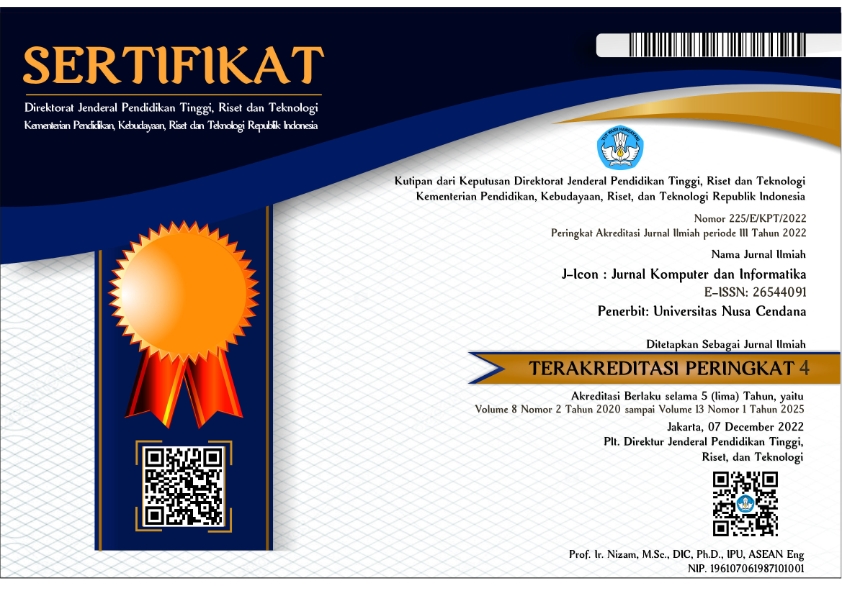SENTIMENT ANALYSIS OF THE #INDONESIATERSERAH IN THE TIME OF COVID-19 USING THE SENTISTRENGTH METHOD
Abstract
The use of social media during the current pandemic is the choice of the community in expressing their thoughts, one of which is Twitter. With the hashtag feature in the Twitter application, people can find out the latest trending information. With the current pandemic condition that raises many social, political, economic problems and so on, making Twitter a place for people to express their emotions. Not long ago, the hashtag #IndonesiaTerserah became a byword in the community because it described the public's disappointment with the handling of the Corona virus (COVID-19) in Indonesia. This study aims to see how the sentiments of the Indonesian people through the hashtag #IndonesiaTerserah. The sentiments were analyzed through the sent-strength algorithm, and classified into 3 classes, namely positive, neutral, and negative. This algorithm uses the lexicon as the basis for calculating the weight of the sentiment strength. The stages carried out in this study are the data crawling stage, data preprocessing and word weighting. The results of this study obtained 236 tweet data with 41.5% neutral sentiment, 32.2% negative sentiment, and 26.3% positive sentiment. This research is expected to be a benchmark for stakeholders in making a decision.
Downloads
References
H. Junawan and N. Laugu, “Eksistensi media sosial , Youtube , Instagram dan WhatsApp ditengah pandemi covid-19 dikalangan masyarakat virtual Indonesia,” J. Ilmu Perpust. dan Inf., vol. 4, no. 1, pp. 41–57, 2020.
D. H. Jayani, “10 Media Sosial yang Paling Sering Digunakan di Indonesia,” Databoks; Katadata.co.id, 2020. .
T. Jo, “Text Mining Concepts, Implementation, and Big Data Challenge,” in Springer, 2019.
A. Sari, F. V., & Wibowo, “Analisis Sentimen Pelanggan Toko Online Jd. Id Menggunakan Metode Naïve Bayes Classifier Berbasis Konversi Ikon Emosi,” Simetris J. Tek. Mesin, Elektro dan Ilmu Komput., vol. 2, no. 2, pp. 681–686, 2019.
I. Zulfa and E. Winarko, “Sentimen Analisis Tweet Berbahasa Indonesia Dengan Deep Belief Network,” IJCCS (Indonesian J. Comput. Cybern. Syst., 2017, doi: 10.22146/ijccs.24716.
U. Khaira, R. Johanda, P. E. P. Utomo, and T. Suratno, “Sentiment Analysis Of Cyberbullying On Twitter Using SentiStrength,” Indones. J. Artif. Intell. Data Min., vol. 3, no. 1, p. 21, 2020, doi: 10.24014/ijaidm.v3i1.9145.
J. Eka Sembodo, E. Budi Setiawan, and Z. Abdurahman Baizal, “Data Crawling Otomatis pada Twitter,” 2016, doi: 10.21108/indosc.2016.111.
M. N. Saadah, R. W. Atmagi, D. S. Rahayu, and A. Z. Arifin, “SISTEM TEMU KEMBALI DOKUMEN TEKS DENGAN PEMBOBOTAN TF-IDF DAN LCS,” JUTI J. Ilm. Teknol. Inf., 2013, doi: 10.12962/j24068535.v11i1.a16.
M. Thelwall, K. Buckley, G. Paltoglou, D. Cai, and A. Kappas, “Sentiment in short strength detection informal text,” J. Am. Soc. Inf. Sci. Technol., 2010, doi: 10.1002/asi.21416.
"Confusion Matrix" . [Online]. Available: https://socs.binus.ac.id/2020/11/01/confusion-matrix/ . [Accessed: 28-Des-2020].
D. H. Wahid and A. SN, “Peringkasan Sentimen Esktraktif di Twitter Menggunakan Hybrid TF-IDF dan Cosine Similarity,” IJCCS (Indonesian J. Comput. Cybern. Syst., 2016, doi: 10.22146/ijccs.16625
"Jelaskan Soal Tagar #IndonesiaTerserah, dt. Tirta: Disini Bukan Kami Menyerah". [Online]. Available: https://www.pikiran-rakyat.com/nasional/pr-01977403/jelaskan-soal-tagar-indonesia-terserah-dr-tirta-disini-bukan-kami-menyerah . [Accessed: 28-Des-2020].
Copyright (c) 2021 J-Icon : Jurnal Komputer dan Informatika

This work is licensed under a Creative Commons Attribution 4.0 International License.
The author submitting the manuscript must understand and agree that if accepted for publication, authors retain copyright and grant the journal right of first publication with the work simultaneously licensed under a Creative Commons Attribution (CC-BY) 4.0 License that allows others to share the work with an acknowledgment of the work’s authorship and initial publication in this journal.
 Bisma Aulia(1*)
Bisma Aulia(1*)




